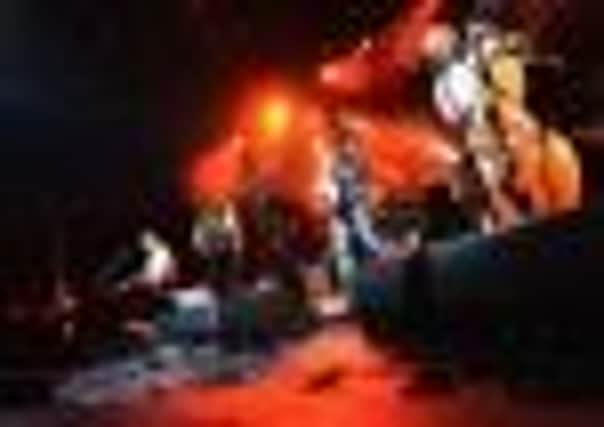Album of the week: Mumford & Sons; Babel


So it turns out you can sell Anglified bluegrass not just on home turf but right back to source. From humble beginnings in the farmyard that is the West London indie folk community, Mumford & Sons, purveyors of bland but palatable banjo-licking musical meal, have shifted copies of their 2009 debut Sigh No More by the sackload, outrunning their less commercial peers to become an award-winning global concern. In short, they have broken the States – and to such a pervasive extent that they have become the White House’s function band of choice.
Company director Marcus Mumford, a big John Steinbeck fan as it happens, has led the big trek westwards with his trusty band of wayfarers, playing up to that old-time wandering minstrels image, not just with those waistcoats and the metaphorical stalk of straw behind the ear, but with the Gentlemen of the Road touring extravaganza, which has brought together a host of invited guests and support bands for a jolly hoedown across the US.
Advertisement
Hide AdAdvertisement
Hide AdBut although Mumford & Sons have jammed with Dylan and Springsteen, and shaken the hand of the leader of the free world, they haven’t forgotten their roots. Back in the UK, keyboard player Ben Lovett continues to dispense Communion, an acoustic music club night, which has now been franchised throughout the UK, showcasing new artists of a non-rocking bent. Live music is their lifeblood and, by the sounds of it, they more or less had to be dragged off the road to shape some new material to fuel their hi-octane sets.
Having established their reputation through tireless gigging, the quartet have tried their best not just to capture that in-concert energy on this follow-up album, but to fashion a set of new songs which will go over well in the arenas that are now their natural habitat and which they can play over and over again without becoming jaded. Or that’s the plan anyway. I know I’m already sick of these excuses for songs before I’ve even heard the live rendition.
The album title is wholly apposite. In the original Babel Bible story, mankind’s efforts to build a tower reaching to the heavens were stymied when God swapped one common language for a host of competing tongues. Here it’s just difficult to fathom what is going on beyond the sound of a band trying to sound busy. The opening title track, like virtually every other number on the album, oscillates between an acoustic clamour, with Mumford’s rhythmic guitar compensating for the lack of a drummer and “Country” Winston Marshall going hell-for-leather on the banjo, and a humdrum quiet passage with woolly impressionistic lyrics about crumbling walls, unborn sons, voices shouting to be heard and the like.
The Biblical references don’t stop at the title. Turbo-powered bluegrass number Whispers In The Dark borrows the lingo of the revival tent meeting. Marcus Mumford is actually the son of a preacherman and his lyrics are rife with religious imagery and concepts, so there are brushes with the Devil, resolutions to serve the Lord, beseeching for healing and forgiveness, searches for salvation and a whole lot of genuflection throughout the album. Yet even when Mumford musters his most torrid tone for the inevitable arm-waving climax, he has none of the charisma, authority or emotion in his delivery to match the intensity he aspires to.
On the bitter lament Holland Road, he gets in a lather over a melody not worth shouting about. As a whole, Mumford & Sons appear to have little talent for a tune – even the relatively catchy single I Will Wait is a pretty rudimentary stomp, which relies on its arrangement to sweep the listener along. The “Coldplay for hillbillies” slur is starting to make sense. Simply swap out the banjo, stick in some resounding piano and achieve more or less the same effect – a mild middle class maelstrom designed to get hands in the air at a festival.
This overriding consideration of how a song will go down live is simply another way of admitting that they work to a formula, one which doesn’t seem to allow for any small intimacies in their music. Just as the quiet Broken Crown sounds like it might touch on something genuinely vulnerable, it rolls out the accepted soaring finish.
But by this point, it’s hard to actually tell the songs apart. Every lyric is a variation on a foggy theme, every track builds to a vacuous crescendo, Mumford hollers fit to burst about being broken or weak (again) and there’s a big, fat void where the craft should be. That might pass muster in a field with thousands of other folks but it doesn’t make for a dynamic album.
Rating: * *